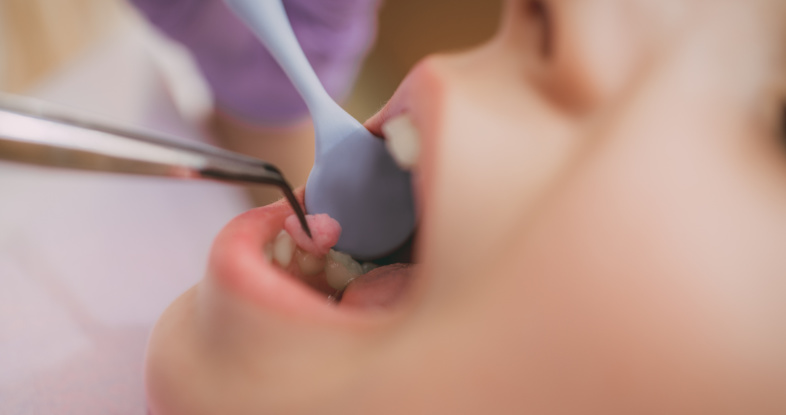Gum disease can be caused by these specific foods.
Practicing good oral hygiene is vital to keeping your teeth healthy, but it’s just as important to make sure you’re paying attention to the health of your gums. Gum disease is caused by plaque, a sticky film that forms on the teeth and contains millions of bacteria. Certain foods can contribute to the formation of plaque, which can lead to gingivitis, a mild form of gum disease. If left untreated, it can develop into a more advanced form of gum disease known as periodontitis, which causes gum recession, infection, loose teeth, and even tooth loss.
Seeing your family dentist for regular teeth cleanings and checkups, eating a balanced diet and practicing a good oral hygiene routine that includes daily flossing and twice-daily brushing can enhance your overall health and prevent gum disease. Daily plaque from food can turn into hardened tartar within a few days, which is why daily removal by brushing and flossing is so important. This hardened tartar is bacteria that stick to the tooth below the gum line causing gum disease, and can only be removed by a professional cleaning.
However, you may want to limit foods and drinks that can damage teeth and cause gum disease. It’s also important to monitor your kids’ consumption of these foods and drinks and to take them to see a dentist who’s well-versed in pediatric dentistry for regular checkups and cleanings.
Soda and Sports Drinks Can Cause Gum Disease
Beverages like soda and sports drinks are high in acid and sugar, which are harmful to teeth and gums. Bacteria in plaque thrive on sugar, turning it into acid, which leads to enamel erosion and gum disease. Caffeinated drinks are particularly bad for gums, as caffeine often causes dry mouth.
Coffee, Tea, and Alcohol
Speaking of dry mouth, coffee, tea, and alcoholic drinks also reduce saliva flow, which can contribute to gum disease. Try to limit consumption and rinse your mouth with water after consuming these acidic caffeinated drinks. If you are experiencing chronic dry mouth, it’s vital to talk with a dentist who provides gentle dental treatment in Palm Harbor.
Acidic Juices and Fruits
Fruit juice is high in sugar, which is not good for teeth and gums. Acidic juices and fruits are particularly damaging, as they contain very high amounts of acid. It’s a good idea to limit your consumption of oranges, lemons, limes, grapefruit, and tomatoes. If you really want to drink juice, stick to less acidic types like carrot, apple, or peach.
Candy and Dried Fruit
In general, sugar is bad for your teeth and gums, but sticky candies like caramels, gummy bears, and sugary chewing gum are particularly harmful and can contribute to gum disease. In the same vein, dried fruit is usually very sticky and should be limited. These treats tend to stick to teeth and gums, which facilitates the growth of bacteria. It’s also important to stay away from sugary hard candies and lollipops, as they take a while to eat and stay in the mouth for a long time. This doesn’t mean you have to give these things up—after all, dried fruit does contain lots of vitamins. After eating any sticky treat, thoroughly rinse your mouth with water. It may seem counter-intuitive, but avoid brushing your teeth for at least 30 minutes after eating. Brushing right away will just push the acids further into tooth enamel.
Starchy Foods
Pasta, crackers, white bread, and other baked goods are simple carbs that convert to sugar very quickly. They also become sticky when you chew them, which can coat the teeth and gums, allowing bacteria to thrive in the nooks and crannies of your mouth. Try sticking to whole grains—in addition to possibly staving off gum disease, they’re better for your overall health. The latest medical research shows a strong relationship between uncontrolled diabetes (high blood sugar) and persistent gum disease. Limiting simple carbs in your diet is beneficial for both conditions!
Popcorn
No trip to the movies is complete without popcorn, but the husks can easily become lodged between teeth and in the spaces between the gum and tooth. If a husk is stuck tightly, an interdental brush can be an effective tool to loosen and remove it. If you happen to get a husk stuck in your teeth and can’t get it out, see an emergency dentist. An embedded popcorn husk can create an abscess, a painful infection in the gum that can lead to serious health issues, gum disease, and tooth loss.
Learn More about Gum Disease Prevention and Treatment at Harborview Dental Health
Being conscious of what you eat and drink doesn’t mean you have to give up the foods you love. At Harborview Dental Health, we believe that patient education is a key factor in helping you keep your teeth healthy and avoid gum disease, so please feel free to ask us any questions you may have about any aspect of gum disease and your overall oral health. For more information or to schedule an appointment with a gentle dentist in Palm Harbor, contact us today at (727) 785-4716.

